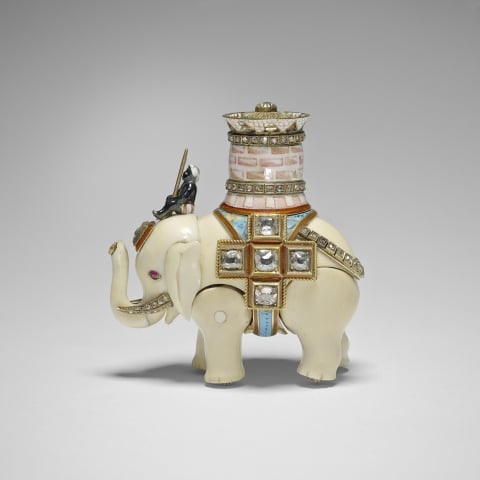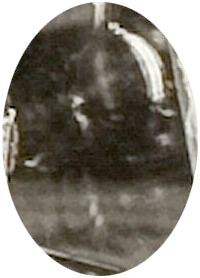If the kids are going to have an Easter Egg Hunt (and not as PETA would have it, a painted potato hunt) they might as well be hunting something that will pay for their room and board.
A repost from March 30, 2018:
Since 2010 we've posted most of the Fabergé Imperial (and one non-imperial) eggs.
However by Easter 1917 the eggs were no longer "Imperial", the Tsar had
been forced to abdicate (March 15) and the invoice for the first of the
1917 eggs was sent to "Mr. Romanov, Nikolai Aleksandrovich".
Well, on the night of 16-17 July 1918 the Bolshi boys shot clubbed and
bayoneted the Romanovs to death and that was that for the eggs.
Except for the seven missing eggs.
It had been eight but in 2014 a scrap metal dealer found one, an odd story we highlighted a couple times. Here's
"That Time An Imperial Russian Fabergé Egg With A Vacheron Constantin Watch Inside Was Discovered At A Midwestern Flea Market And Became The Most Expensive Timepiece On Earth"

In one of those stunning stories only made possible by the Internet, in 2012 a man turned to Google to search for "Vacheron & Constantin" and "egg" to find that the jewel-encrusted gold egg housing a Vacheron watch he purchased for $13,302 in the early 2000s at a Midwestern flea market was in fact an 1887 birthday gift for Tsar Alexander III from Peter Carl Fabergé. It has now sold privately for millions, likely making it the most expensive timepiece on earth.
The unnamed individual stumbled on a 2011 Telegraph article entitled "Is this £20 million nest-egg on your mantelpiece?" The egg was the third of 54 Fabergé eggs owned by the Russian royal family and had been lost since 1922. It is recorded that in 1922 this egg was transferred from the Kremlin Armoury, which had confiscated the eggs in 1917 when the Tsar was overthrown, to the special plenipotentiary of the Council of People's Commissars, Ivan Gavrilovich Chinariov. Beyond the written records, a 1902 photograph of the egg on exhibition in St. Petersburg also survived....MOREThere is something fishy about this story as there is with many tales of Russian loot. The "junk dealer" almost immediately resold the egg in a private transaction not at auction, and no names were disclosed.
If interested there is also "Find of the century? U.S. scrap dealer finds $20 million Faberge egg"
Here's the latest on the world's most interesting Easter egg hunt. From the Daily Mail, January 5, 2018:
Is lost £30million Faberge egg in a Preston bank vault? Family of British Cold War 'spy' say the Russian treasure may have been locked away in a safety deposit box when he died
- Dr Maxwell Naesmyth Wilcock from Preston visited Moscow during the 1950s
- His family believe he may have purchased a Faberge egg in Mayfair in 1952
- Dr Wilcock may have been a spy during the height of the Cold War with Russia
The case of the missing Faberge egg could be a step closer to being cracked – amid claims it is locked away in a Lancashire bank vault.
The £30million treasure has not been seen since it was sold at a Mayfair jewellers 65 years ago.
But now the family of a dead Cold War ‘spy’ say he owned the bejewelled egg and used to show it off to relatives....MUCH MORE

Yeah, he's a spy.
Another tiny treasure turned up since the Third Imperial egg (above). In October 2015 artnet reported
Secret Object Hidden in Fabergé Egg Discovered in British Royal Collection
A long-lost Fabergé treasure has been discovered in the British royal family’s art collection: An automaton elephant embellished in diamonds and rubies originally hidden as a “surprise” inside the Diamond Trellis Eggcommissioned by czar Alexander III in 1892.
The find was announced this week by Royal Collection Trust senior curator Caroline de Guitaut at a conference at the Fabergé Museum in St. Petersburg. The Trust (currently exhibiting photos of Queen Elizabeth II) boasts an impressive collection of Russian lapidary art, but no one suspected that the tiny elephant, acquired by King George V in 1935, had an imperial pedigree...MORE

Photo: Royal Collection Trust/© Her Majesty Queen Elizabeth II 2015.
If interested here are descriptions of the still lost eggs, in most cases with zero or only one photograph before they went missing:
Where are the Lost Fabergé Imperial Eggs?
The wiki one says this, The Cherub With Chariot, in the one extant photo:

Might look like this:

So have your little cherubs keep an eye peeled for a cherub.